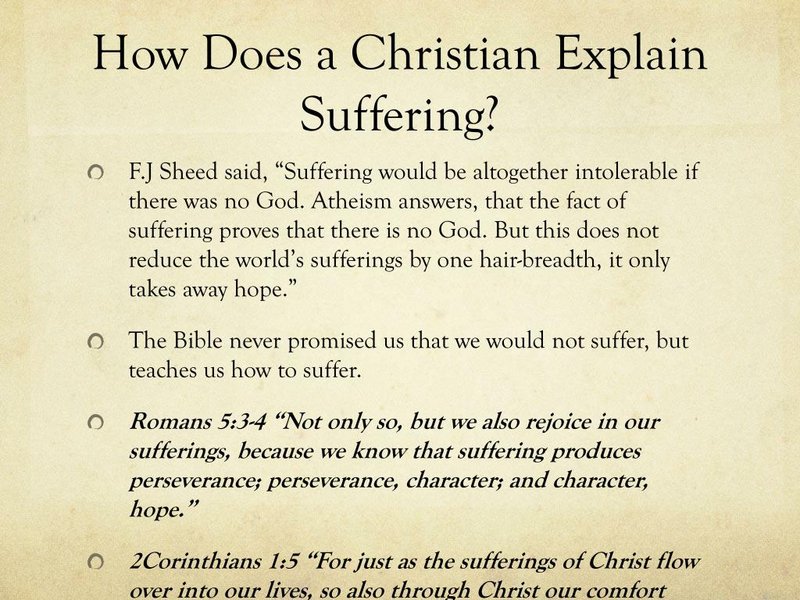· Quick Answers · 4 min read
Why Does God Allow Suffering? 5 Common Doubts Explained
Explore the complexities of why God allows suffering in Christianity, addressing common doubts and questions about faith, scientific evidence, life after death, and the variations in Bible versions. Gain insights and clarity on these crucial topics.

Why Does God Allow Suffering? 5 Common Doubts Explained
In the realm of Christianity, the question of why God allows suffering is a deeply contemplative and often perplexing one. It challenges believers to reconcile the existence of a loving and all-powerful God with the presence of pain and suffering in the world. While there may not be a definitive answer that fully satisfies every doubt, examining common doubts about this issue can shed light on the Christian perspective. In this article, we will explore five common doubts related to the question of why God allows suffering and provide comprehensive explanations rooted in the principles of Christianity.
Doubt #1: Is it wrong to question my faith?
As human beings, it is natural for us to question and seek understanding. Questioning our faith does not indicate a lack of belief or devotion. In fact, engaging in thoughtful introspection and seeking answers can strengthen our spiritual journey. The Bible encourages believers to seek wisdom and understanding (Proverbs 2:3-6) and to test everything (1 Thessalonians 5:21). By questioning our faith, we can deepen our relationship with God and develop a more authentic and informed belief system.
Doubt #2: Is there scientific evidence for Christianity?
Science and faith are often viewed as opposing forces, but they can coexist harmoniously. While science helps us understand the natural world, it cannot provide answers to existential questions or matters of faith. However, scientific discoveries can complement and enhance our understanding of God’s creation. Many scientists find that their study of the natural world leads them to marvel at its complexity and point towards a divine creator. Ultimately, faith in Christianity is built on personal experience, historical evidence, and spiritual encounters rather than empirical scientific proof.
Doubt #3: What happens after death?
The question of what happens after death has captivated human curiosity throughout history. In Christianity, the belief in an afterlife is central to its teachings. The Bible assures believers that there is life beyond death and promises eternal fellowship with God for those who have accepted Jesus Christ as their savior (John 3:16). Christians believe in the resurrection of the dead, where both body and soul are restored. While the specifics of the afterlife remain a mystery, scripture provides glimpses of a place of joy, peace, and eternal communion with God.
Doubt #4: Why are there different Bible versions?
The existence of different Bible versions can be confusing and raise doubts about the reliability of scripture. However, it is important to understand that these variations occur due to differences in translation methods and the use of ancient manuscripts. The original texts of the Bible were written in Hebrew, Aramaic, and Greek, which have undergone translations into various languages over time. Different versions strive to strike a balance between accuracy and accessibility for different audiences. Despite these variations, the core message and teachings of the Bible remain consistent across versions.
Doubt #5: How can a loving God allow suffering?
The presence of suffering in the world can be deeply unsettling, especially when viewed through the lens of a loving God. However, Christianity offers insights into this paradox. Suffering entered the world as a consequence of humanity’s rebellion against God (Genesis 3). It is a result of living in a fallen world tainted by sin. While God allows suffering, He does not delight in it (Psalm 34:18). Instead, He uses it to draw people closer to Him, develop character, and strengthen faith (James 1:2-4). Moreover, God sent His Son Jesus Christ to suffer on behalf of humanity, demonstrating His love and offering redemption from sin.
In conclusion, grappling with the question of why God allows suffering is an integral part of the Christian faith journey. By addressing common doubts surrounding this issue, we can deepen our understanding and strengthen our relationship with God. It is important to embrace the tension between faith and doubt, seeking wisdom from scripture, personal experiences, and reputable sources within the Christian community. Ultimately, the Christian perspective on suffering emphasizes the redemptive power of God’s love and the transformative potential of trials in shaping our character and drawing us closer to Him.



